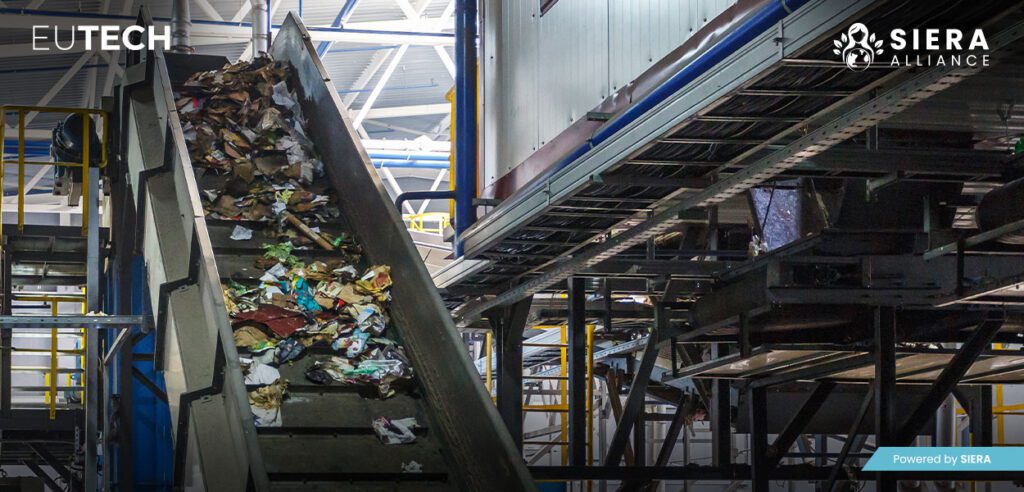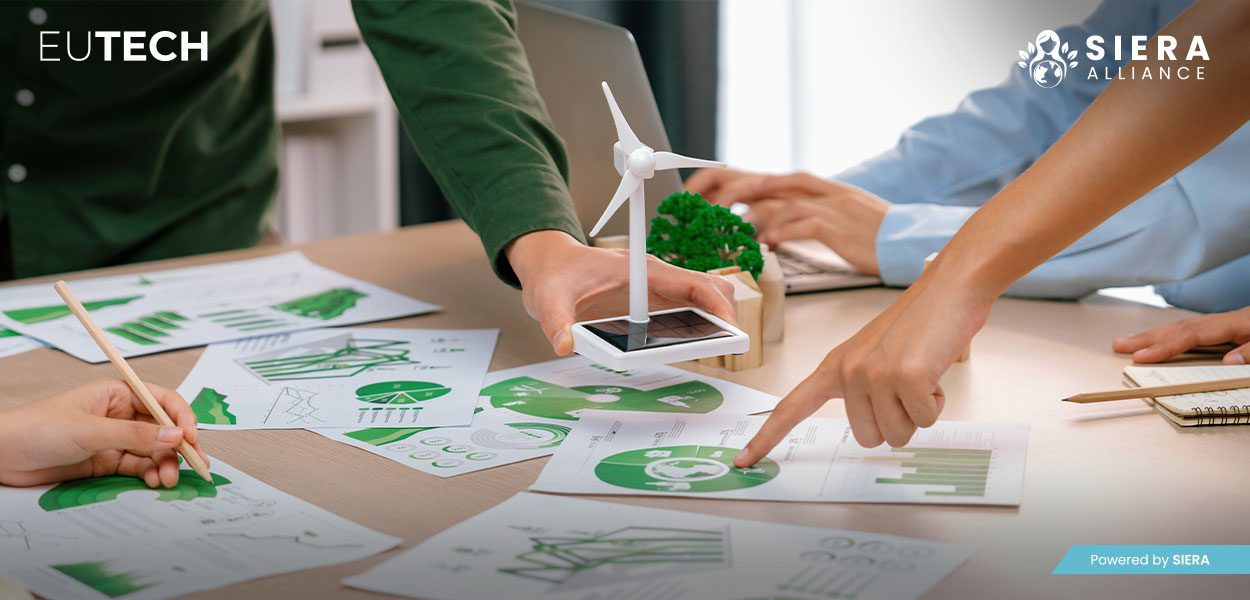Rethinking Industrial Manufacturing: The Shift to Circular Economy Models
Industrial manufacturing is a cornerstone of global economic growth but has traditionally relied on a linear “take-make-dispose” model. This approach, while effective in driving production, has resulted in significant resource depletion and waste generation. To address these challenges, industries are transitioning to circular economy business models, focusing on waste reduction in manufacturing, resource recovery, and sustainable practices.
On 8th October 2024, the EUTECH – Industry and Manufacturing Council powered by SIERA Alliance hosted a webinar titled “Adopting Circular Economy Models in Industrial Manufacturing.” Moderated by SIERA Alliance, the event featured insights from keynote speaker Ayesha Naeem and panelists Nadine Braun (E.ON) and Natalia Torres Di Bello (M&P Climate).
Key Challenges in Adopting Circular Economy Models
The session outlined several critical challenges facing the industrial sector:
1. Resource Scarcity and Supply Chain Vulnerabilities
The manufacturing sector relies heavily on critical raw materials, 30% of which are sourced from unstable regions. This dependency creates supply chain risks and cost volatility, further aggravated by low recovery rates of essential materials like cobalt and rare earth elements.
2. Underdeveloped Recycling Infrastructure
Despite advancements, Europe’s recycling systems are not equipped to handle the complexity of modern materials. Sectors like electronics suffer from inadequate industrial recycling processes, leading to significant resource loss.
3. Resistance to Circular Business Models
Transitioning from linear to circular business models demands a cultural and operational shift. Many organizations face resistance due to ingrained practices and the short-term focus on financial gains.
4. Technological Innovation Gaps
Circular manufacturing relies on advanced technologies for resource recovery and recycling. However, high costs and lack of specialized expertise hinder widespread adoption.
5. Skilled Workforce Shortage
The shift to circularity requires new skills in areas like modular design, reverse logistics, and remediation techniques. Many companies struggle to find or train qualified personnel.

Solutions and Strategies for Circular Economy Adoption
The webinar provided actionable solutions to overcome these challenges:
1. Building Resilient Supply Chains
Sourcing materials locally and increasing the use of recycled inputs reduces dependency on volatile international markets. This approach aligns with sustainable industrial practices and supports supply chain resilience.
2. Enhancing Recycling and Waste Management
Advanced waste sorting and classification systems improve material recovery. Investing in industrial waste management infrastructure minimizes environmental impact and supports zero waste manufacturing.
3. Leveraging Digital Twins
Digital twins enable real-time monitoring and optimization of manufacturing processes, enhancing lifecycle assessment, and reducing resource use. These tools also support predictive maintenance and minimize operational disruptions.
4. Integrating Circularity in Product Design
Designing for durability, repairability, and recyclability ensures products align with sustainable manufacturing practices. Early integration of circular principles reduces waste and extends product lifecycles.
5. Upskilling the Workforce
Targeted training programs equip workers with the expertise needed for eco-friendly manufacturing, modular design, and advanced recycling techniques, ensuring the successful implementation of circular practices.
Transformation Opportunities in Industrial Manufacturing
Transitioning to circular economy models offers significant benefits:
| Transformation Area | Benefits | Impact |
| Cost Efficiency | Reduces dependency on virgin materials and waste management expenses. | Saves up to 20% on material procurement and waste disposal costs. |
| New Revenue Streams | Circular business models such as leasing and product-as-a-service generate recurring income. | The European circular economy market is projected to grow by 10-15% annually. |
| Enhanced Competitiveness | Positions companies as sustainability leaders, attracting ESG-focused clients. | Increases customer loyalty and market share. |
| Improved Environmental Impact | Reduces carbon emissions and waste, supporting global climate goals. | Aligns with EU sustainability regulations and enhances brand reputation. |
| Stronger Stakeholder Relations | Involves communities and investors in sustainable practices. | Builds trust and promotes long-term partnerships. |

Best Practices for Circular Economy in Industrial Manufacturing
- Adopt Modular Design and Reverse Logistics: Incorporate modular design principles to facilitate easy disassembly and recycling. Implement reverse logistics systems for efficient product returns and material recovery.
- Foster Collaboration Across Supply Chains: Engage stakeholders at every stage to ensure alignment with circular supply chain objectives and regulatory compliance.
- Invest in R&D: Develop innovative technologies for material recovery, recycling, and waste reduction to support sustainable manufacturing practices.
- Monitor and Report Progress: Utilize digital tools to track and report environmental performance, ensuring transparency and compliance with ESRS E5 standards.
Upcoming Events and Opportunities
Stay updated on future events hosted by the EUTECH Industry and Manufacturing Council powered by SIERA Alliance. For insights into sustainability in manufacturing and networking opportunities, explore the SIERA Alliance Event Calendar. Join us in building a sustainable and resilient industrial sector.
Conclusion: Unlocking the Potential of Circular Manufacturing
Adopting circular economy business models is essential for achieving industrial sustainability. By integrating resource recovery, leveraging advanced technologies, and fostering collaboration, manufacturers can transform challenges into opportunities, ensuring long-term success and environmental compliance. Collaborating with organizations like SIERA Alliance and EUTECHenables firms to implement impactful solutions that benefit both the planet and the industry.
To learn more about how SIERA Alliancecan support your journey toward sustainable industrial manufacturing, visit our website. Join us in building a responsible future for manufacturing.









